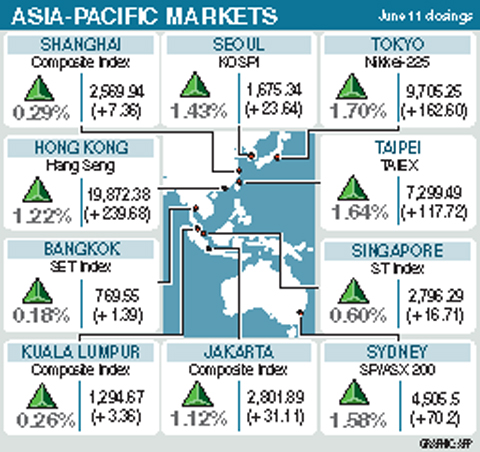Asian stocks fell for a second week after a US jobs report missed economists’ estimates and concern grew that Europe’s crisis of government debt is spreading.
LG Electronics Inc, which counts North America as its biggest market, slumped 11 percent in Seoul this week after a government report showed US employers hired fewer workers last month than forecast. Nintendo Co, a Japanese game maker that gets 34 percent of its sales in Europe, retreated 8.1 percent after the euro weakened. Mitsui & Co, which holds a stake in an oil field operated by BP PLC where an oil spill is unfolding, tumbled 9.5 percent in Tokyo on concern earnings will suffer.
The MSCI Asia-Pacific Index slid 0.9 percent to 112.44 this week. The gauge plunged 3.3 percent on Monday, its steepest drop since March 30 last year after a Hungarian government official said the country’s economy was in a “very grave situation.”

“What I’m afraid of is that the volatility of the euro can trigger turmoil in the financial markets, prompting investors to reduce risk assets including stocks,” said Akio Yoshino, chief economist in Tokyo at Societe Generale Asset Management (Japan) Inc, which manages the equivalent of US$18 billion.
Japan’s Nikkei 225 Stock Average tumbled 2 percent this week even as a government report showed Japan’s GDP rose at an annualized 5 percent rate in the three months ended March 31, faster than the 4.2 percent projected by economists.
The S&P/ASX 200 Index gained 1.3 percent in Sydney, as gains in oil and copper prices lifted mining companies. The statistics bureau reported on Thursday that the jobless rate fell to 5.2 percent last month from 5.4 percent from the previous month.
The MSCI Asia-Pacific Index has slumped about 13 percent from its high this year on April 15 amid growing concern European countries in addition to Greece will struggle to curb their budget deficits or repay debt. The decline has dragged the average price of companies in the gauge to 14.4 times estimated earnings, compared with 20.1 times at the beginning of this year, according to data compiled by Bloomberg.
Taiwan’s TAIEX rose 117.72, or 1.63 percent, to 7,299.49 at the close of Taipei trading on Friday after a strong showing on Wall Street overnight as a euro rebound against the US dollar gave investors at home and abroad some relief from concerns over debt problems in the eurozone, according to dealers.
The TAIEX fell 0.6 percent this week.
The financial sector posted the largest gains, up 2.7 percent. Paper and pulp, and plastics and chemicals closed up 1.6 percent each, while machinery and electronics shares were 1.5 percent higher.
Other markets on Friday:
Manila closed 1.27 percent, or 40.95 points, higher from Thursday at 3,265.44.
Wellington rose 1.30 percent, or 38.94 points, from Thursday to 3,041.27.
Mumbai rose 0.84 percent, or 142.87 points, from Thursday to 17,064.95.

Rainfall is expected to become more widespread and persistent across central and southern Taiwan over the next few days, with the effects of the weather patterns becoming most prominent between last night and tomorrow, the Central Weather Administration (CWA) said yesterday. Independent meteorologist Daniel Wu (吳德榮) said that based on the latest forecast models of the combination of a low-pressure system and southwesterly winds, rainfall and flooding are expected to continue in central and southern Taiwan from today to Sunday. The CWA also warned of flash floods, thunder and lightning, and strong gusts in these areas, as well as landslides and fallen

WAITING GAME: The US has so far only offered a ‘best rate tariff,’ which officials assume is about 15 percent, the same as Japan, a person familiar with the matter said Taiwan and the US have completed “technical consultations” regarding tariffs and a finalized rate is expected to be released soon, Executive Yuan spokeswoman Michelle Lee (李慧芝) told a news conference yesterday, as a 90-day pause on US President Donald Trump’s “reciprocal” tariffs is set to expire today. The two countries have reached a “certain degree of consensus” on issues such as tariffs, nontariff trade barriers, trade facilitation, supply chain resilience and economic security, Lee said. They also discussed opportunities for cooperation, investment and procurement, she said. A joint statement is still being negotiated and would be released once the US government has made

SOUTH CHINA SEA? The Philippine president spoke of adding more classrooms and power plants, while skipping tensions with China over disputed areas Philippine President Ferdinand Marcos Jr yesterday blasted “useless and crumbling” flood control projects in a state of the nation address that focused on domestic issues after a months-long feud with his vice president. Addressing a joint session of congress after days of rain that left at least 31 dead, Marcos repeated his recent warning that the nation faced a climate change-driven “new normal,” while pledging to investigate publicly funded projects that had failed. “Let’s not pretend, the people know that these projects can breed corruption. Kickbacks ... for the boys,” he said, citing houses that were “swept away” by the floods. “Someone has

‘CRUDE’: The potential countermeasure is in response to South Africa renaming Taiwan’s representative offices and the insistence that it move out of Pretoria Taiwan is considering banning exports of semiconductors to South Africa after the latter unilaterally downgraded and changed the names of Taiwan’s two representative offices, the Ministry of Foreign Affairs (MOFA) said yesterday. On Monday last week, the South African Department of International Relations and Cooperation unilaterally released a statement saying that, as of April 1, the Taipei Liaison Offices in Pretoria and Cape Town had been renamed the “Taipei Commercial Office in Johannesburg” and the “Taipei Commercial Office in Cape Town.” Citing UN General Assembly Resolution 2758, it said that South Africa “recognizes the People’s Republic of China (PRC) as the sole